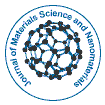Notre groupe organise plus de 3 000 séries de conférences Événements chaque année aux États-Unis, en Europe et en Europe. Asie avec le soutien de 1 000 autres Sociétés scientifiques et publie plus de 700 Open Access Revues qui contiennent plus de 50 000 personnalités éminentes, des scientifiques réputés en tant que membres du comité de rédaction.
Les revues en libre accès gagnent plus de lecteurs et de citations
700 revues et 15 000 000 de lecteurs Chaque revue attire plus de 25 000 lecteurs
Abstrait
Analysis as a Micro Fibrous Graft for Components in Synthetic Biology
Kyaw Myo Zaw
A biocompatible and biodegradable poly (1,4-butylene succinate) microfibrous tubular scaffold has been produced through the use of electrospinning.The scaffold’s morphology was N-optimized to prevent cell infiltration through the graft’s wall and to promote cell integration, adhesion, and growth as a micro-porous conduit with a small diameter.The scaffold’s mechanical properties and morphology were examined and compared to those of native conduits.Scaffolds were then seeded with adult normal human dermal fibroblasts to test cytocompatibility in vitro.The hemolytic effect was assessed following incubation with whole blood that had been diluted.The graft is able to provide initial mechanical support and functionality thanks to the demonstrated degradation profile during colonization and subsequent replacement by host cells. Elastic modulus (less than 17.5 1.6 MPa), ultimate tensile stress (less than 3.95 0.17 MPa), strain to failure (less than 57 4.5%), and suture retention force (less than 2.65 0.32 N) were all within the physiological range for tubular conduits. There was no delamination of the scaffold’s mechanical properties.This combination of properties may make it possible to use PBS as a biomaterial to create scaffolds that support host cell remodelling and provide structure and function over time.
Revues par sujet
- Agriculture et Aquaculture
- Biochimie
- Chimie
- Food & Nutrition
- Génétique et biologie moléculaire
- Géologie et sciences de la Terre
- Immunologie et microbiologie
- Ingénierie
- La science des matériaux
- Le physique
- Science générale
- Sciences cliniques
- Sciences environnementales
- Sciences médicales
- Sciences pharmaceutiques
- Sciences sociales et politiques
- Sciences vétérinaires
- Soins infirmiers et soins de santé
Revues cliniques et médicales
- Allaitement
- Anesthésiologie
- Biologie moléculaire
- Cardiologie
- Chirurgie
- Dentisterie
- Dermatologie
- Diabète et endocrinologie
- Gastro-entérologie
- Immunologie
- La génétique
- Maladies infectieuses
- Médecine
- Microbiologie
- Neurologie
- Oncologie
- Ophtalmologie
- Pédiatrie
- Recherche clinique
- Soins de santé
- Toxicologie

 English
English  Spanish
Spanish  Chinese
Chinese  Russian
Russian  German
German  Japanese
Japanese  Portuguese
Portuguese  Hindi
Hindi